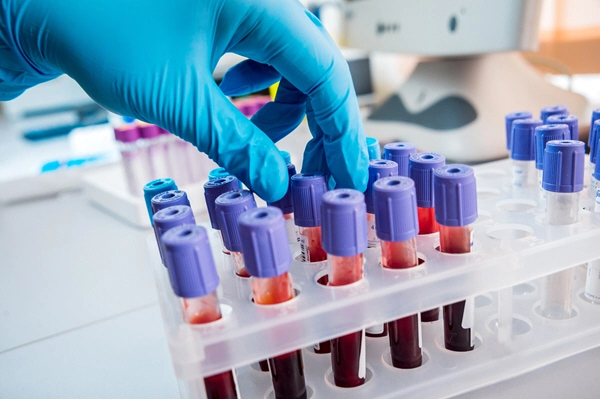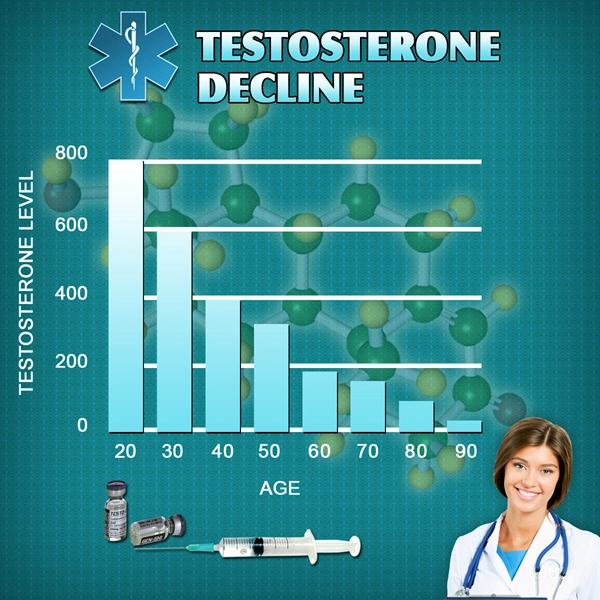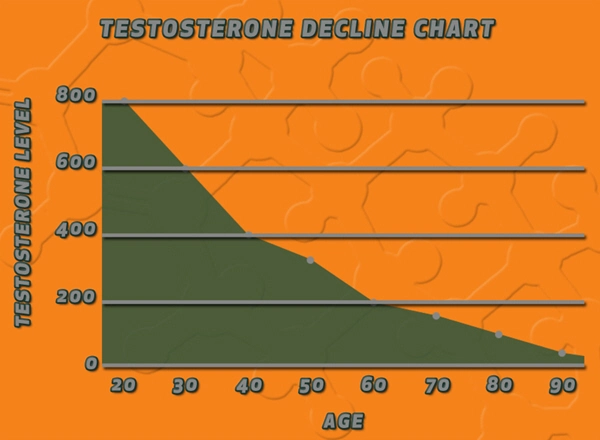Introduction to Testosterone and Its Role
Testosterone, often hailed as the quintessential male hormone, plays a pivotal role in numerous bodily functions beyond merely shaping physical characteristics. It is instrumental in maintaining muscle mass, bone density, and red blood cell production, while also influencing mood, cognitive function, and libido. For American males grappling with chronic diseases, understanding the intricate relationship between testosterone levels and their health is crucial for managing their overall well-being.
The Impact of Chronic Illness on Testosterone Levels
Chronic diseases such as diabetes, heart disease, and chronic obstructive pulmonary disease (COPD) can significantly alter testosterone levels. Research indicates that men with these conditions often exhibit lower testosterone levels compared to their healthy counterparts. This decline can exacerbate the symptoms of the disease, creating a vicious cycle that further deteriorates health. For instance, low testosterone can lead to reduced muscle mass, which is particularly detrimental for patients with heart disease, as it can impair cardiac function.
Strategies for Managing Testosterone Levels in Chronic Disease
Managing testosterone levels in the face of chronic illness requires a multifaceted approach. Here are several strategies that can be employed:
1. Regular Monitoring and Hormone Replacement Therapy (HRT)
Regular monitoring of testosterone levels through blood tests is essential for men with chronic diseases. If levels are found to be consistently low, hormone replacement therapy (HRT) may be recommended. HRT can help restore testosterone to normal levels, potentially alleviating symptoms such as fatigue, depression, and decreased libido. However, it is crucial to work closely with a healthcare provider to tailor the therapy to individual needs and monitor for any potential side effects.
2. Lifestyle Modifications
Adopting a healthy lifestyle can significantly impact testosterone levels. Regular exercise, particularly resistance training, has been shown to boost testosterone production. A balanced diet rich in vitamins and minerals, such as zinc and vitamin D, is also essential. Moreover, managing stress through techniques like meditation or yoga can help maintain hormonal balance, as chronic stress is known to negatively affect testosterone levels.
3. Addressing Underlying Health Conditions
Effectively managing the underlying chronic disease is paramount. For example, optimizing blood sugar control in diabetic patients can help mitigate the impact on testosterone levels. Similarly, ensuring adequate treatment for heart disease or COPD can prevent further declines in hormone levels. Collaborative care involving endocrinologists, cardiologists, and other specialists can provide comprehensive management.
4. Sleep and Testosterone
Quality sleep is another critical factor in maintaining healthy testosterone levels. Studies have shown that men who get less than the recommended 7-9 hours of sleep per night tend to have lower testosterone levels. Ensuring a regular sleep schedule and creating a conducive sleep environment can help improve sleep quality and, consequently, testosterone levels.
The Psychological Aspect of Hormone Health
The psychological impact of chronic illness should not be underestimated. Low testosterone can contribute to mood swings, depression, and anxiety, which can further complicate the management of chronic diseases. Psychological support, whether through counseling or support groups, can be invaluable in helping men cope with these challenges and maintain a positive outlook on their health journey.
Conclusion: A Holistic Approach to Hormone Health
For American males living with chronic diseases, managing testosterone levels is not just about addressing a single hormone but adopting a holistic approach to health. By combining regular monitoring, hormone replacement therapy when necessary, lifestyle modifications, and effective management of underlying conditions, men can improve their quality of life and mitigate the impact of chronic illness on their hormone health. Embracing this comprehensive strategy can pave the way for better health outcomes and a more fulfilling life despite the challenges posed by chronic diseases.

- Unlocking Vigor: Testosterone, The Quintessential Powering Force of Masculinity [Last Updated On: February 25th, 2025] [Originally Added On: February 25th, 2025]
- Hormonal Harmony: The Orchestra Conductor of Life - Testosterone [Last Updated On: February 26th, 2025] [Originally Added On: February 26th, 2025]
- A Chronological Expedition: Testosterone's Mysterious and Pivotal Voyage Across Human History [Last Updated On: February 27th, 2025] [Originally Added On: February 27th, 2025]
- The Unseen Power: Unveiling the Unsuspected Advantages of Robust Testosterone Levels [Last Updated On: February 28th, 2025] [Originally Added On: February 28th, 2025]
- Demystifying Testosterone: A Comprehensive Exploration of Fact and Fiction [Last Updated On: February 28th, 2025] [Originally Added On: February 28th, 2025]
- Harnessing the Vigor of Life: Decoding the Influence of Testosterone [Last Updated On: March 1st, 2025] [Originally Added On: March 1st, 2025]
- Exploring Nutritional Strategies for Testosterone Enhancement [Last Updated On: March 2nd, 2025] [Originally Added On: March 2nd, 2025]
- Enhancing Testosterone Levels Through Exercise: Mechanisms, Types of Exercises, and Age-Related Considerations [Last Updated On: March 3rd, 2025] [Originally Added On: March 3rd, 2025]
- Understanding Testosterone's Role in Cognitive Function and Mood [Last Updated On: March 4th, 2025] [Originally Added On: March 4th, 2025]
- Unveiling the Vital Role of Testosterone in Women's Health: A Comprehensive Overview [Last Updated On: March 4th, 2025] [Originally Added On: March 4th, 2025]
- Understanding Testosterone's Role in Male Health and Reproductive Function [Last Updated On: March 5th, 2025] [Originally Added On: March 5th, 2025]
- Genetics and Testosterone: Predestined Levels or Modifiable by Lifestyle? [Last Updated On: March 5th, 2025] [Originally Added On: March 5th, 2025]
- Testosterone's Crucial Role in Male Development and Health Across Lifespan [Last Updated On: March 6th, 2025] [Originally Added On: March 6th, 2025]
- Optimizing Testosterone Levels: Lifestyle Strategies for Health and Vitality [Last Updated On: March 7th, 2025] [Originally Added On: March 7th, 2025]
- Optimizing Men's Health: Advances in Testosterone Replacement Therapy and Personalized Approaches [Last Updated On: March 8th, 2025] [Originally Added On: March 8th, 2025]
- Managing Testosterone Decline in Men: Strategies for Health and Vitality as You Age [Last Updated On: March 9th, 2025] [Originally Added On: March 9th, 2025]
- Unveiling the Nightly Ritual: How Sleep Boosts Testosterone in American Men [Last Updated On: March 12th, 2025] [Originally Added On: March 12th, 2025]
- Unlocking the Potential of Testosterone: Pioneering Advances in Hormonal Health for American Males [Last Updated On: March 13th, 2025] [Originally Added On: March 13th, 2025]
- Unraveling the Interplay of Stress, Cortisol, and Testosterone: A Guide to Hormonal Harmony for American Males [Last Updated On: March 13th, 2025] [Originally Added On: March 13th, 2025]
- Unleashing Potential: The Role of Testosterone in Athletic Performance Among American Males [Last Updated On: March 15th, 2025] [Originally Added On: March 15th, 2025]
- Testosterone's Impact on Metabolism and Fat Burning in American Males [Last Updated On: March 18th, 2025] [Originally Added On: March 18th, 2025]
- Boosting Testosterone: Supplements, Herbs, Diet, and Exercise Strategies for American Males [Last Updated On: March 18th, 2025] [Originally Added On: March 18th, 2025]
- Testosterone's Impact on Heart Health in American Men: Risks, Therapy, and Lifestyle [Last Updated On: March 18th, 2025] [Originally Added On: March 18th, 2025]
- Testosterone's Crucial Role in Maintaining Bone Density in American Males [Last Updated On: March 19th, 2025] [Originally Added On: March 19th, 2025]
- Testosterone's Role in Enhancing Workplace Productivity and Cognitive Function [Last Updated On: March 19th, 2025] [Originally Added On: March 19th, 2025]
- Testosterone's Role in Male Libido: Strategies for Enhancing Sexual Health [Last Updated On: March 19th, 2025] [Originally Added On: March 19th, 2025]
- Low Testosterone in Men: Causes, Symptoms, and Effective Treatment Options [Last Updated On: March 20th, 2025] [Originally Added On: March 20th, 2025]
- Environmental Toxins and Their Impact on Testosterone Levels in American Males [Last Updated On: March 20th, 2025] [Originally Added On: March 20th, 2025]
- Testosterone's Impact on Mood, Memory, and Motivation in American Males [Last Updated On: March 21st, 2025] [Originally Added On: March 21st, 2025]
- Testosterone's Role in Immune Health and Protection in American Males [Last Updated On: March 21st, 2025] [Originally Added On: March 21st, 2025]
- Achieving Hormonal Harmony: Testosterone's Interplay in Men's Health [Last Updated On: March 22nd, 2025] [Originally Added On: March 22nd, 2025]
- Meditation's Impact on Testosterone Levels in American Males: Benefits and Practices [Last Updated On: March 22nd, 2025] [Originally Added On: March 22nd, 2025]
- Resistance Training Boosts Testosterone: Benefits and Strategies for American Males [Last Updated On: March 22nd, 2025] [Originally Added On: March 22nd, 2025]
- Navigating Testosterone Concerns: Preparation, Communication, and Management Strategies [Last Updated On: March 22nd, 2025] [Originally Added On: March 22nd, 2025]
- Optimal Testosterone Levels: Importance, Monitoring, and Natural Enhancement Strategies for American Males [Last Updated On: March 22nd, 2025] [Originally Added On: March 22nd, 2025]
- Testosterone's Role in Enhancing Cardiovascular Health in American Males [Last Updated On: March 23rd, 2025] [Originally Added On: March 23rd, 2025]
- Andropause: Understanding Male Menopause and Testosterone Decline in American Men [Last Updated On: March 23rd, 2025] [Originally Added On: March 23rd, 2025]
- Urban vs. Rural Living: Impacts on Testosterone Levels in American Males [Last Updated On: March 23rd, 2025] [Originally Added On: March 23rd, 2025]
- Testosterone Monitoring: Empowering Men with Health Apps and Wearables [Last Updated On: March 23rd, 2025] [Originally Added On: March 23rd, 2025]
- Intermittent Fasting: A Promising Method to Boost Testosterone in American Males [Last Updated On: March 24th, 2025] [Originally Added On: March 24th, 2025]
- Testosterone's Impact on Ambition and Competitiveness in American Men [Last Updated On: March 24th, 2025] [Originally Added On: March 24th, 2025]
- Testosterone Revolution: Redefining Masculinity and Health in the 21st Century [Last Updated On: March 24th, 2025] [Originally Added On: March 24th, 2025]
- Testosterone's Role in Muscle Recovery for American Males: Strategies and Insights [Last Updated On: March 24th, 2025] [Originally Added On: March 24th, 2025]
- Testosterone's Impact on Mental Health and Cognitive Function in American Men [Last Updated On: March 25th, 2025] [Originally Added On: March 25th, 2025]
- Boosting Testosterone: Diet, Exercise, Sleep, and Stress Management for American Males [Last Updated On: March 25th, 2025] [Originally Added On: March 25th, 2025]
- Hormonal Health for American Males: Understanding and Boosting Testosterone Levels [Last Updated On: March 25th, 2025] [Originally Added On: March 25th, 2025]
- Social Interactions Impact Testosterone Levels in American Males: Health Implications [Last Updated On: March 25th, 2025] [Originally Added On: March 25th, 2025]
- Testosterone's Role in Longevity: Insights for American Males [Last Updated On: March 25th, 2025] [Originally Added On: March 25th, 2025]
- Testosterone's Crucial Role in Enhancing Mental Resilience in American Men [Last Updated On: March 25th, 2025] [Originally Added On: March 25th, 2025]
- Music and Art Boost Testosterone in American Men: A Holistic Approach [Last Updated On: March 25th, 2025] [Originally Added On: March 25th, 2025]
- Testosterone Management for American Males: Lifestyle, Diet, and Medical Insights [Last Updated On: March 25th, 2025] [Originally Added On: March 25th, 2025]
- Boosting Testosterone: The Vital Role of Outdoor Activities for American Males [Last Updated On: March 26th, 2025] [Originally Added On: March 26th, 2025]
- Positivity Boosts Testosterone: Strategies for American Men's Hormonal Health [Last Updated On: March 26th, 2025] [Originally Added On: March 26th, 2025]
- Testosterone's Impact on Sleep: Strategies for American Males to Enhance Rest [Last Updated On: March 26th, 2025] [Originally Added On: March 26th, 2025]
- Boost Testosterone Naturally: Effective Home Workouts with Resistance Bands [Last Updated On: March 26th, 2025] [Originally Added On: March 26th, 2025]
- Modern American Diets and Their Impact on Men's Testosterone Levels: Strategies for Optimization [Last Updated On: March 26th, 2025] [Originally Added On: March 26th, 2025]
- Testosterone's Impact on Body Image and Self-Esteem in American Males [Last Updated On: March 26th, 2025] [Originally Added On: March 26th, 2025]
- Testosterone Replacement Therapy: Benefits, Risks, and Long-Term Considerations for Men [Last Updated On: March 26th, 2025] [Originally Added On: March 26th, 2025]
- Personalized Testosterone Therapy: Tailoring Treatment to Genetic Profiles for American Men [Last Updated On: March 26th, 2025] [Originally Added On: March 26th, 2025]
- Testosterone's Influence on Risk-Taking in American Men: Biological and Cultural Insights [Last Updated On: March 27th, 2025] [Originally Added On: March 27th, 2025]
- Optimizing Testosterone: Sleep, Nutrition, Exercise, and Lifestyle for American Men's Health [Last Updated On: March 27th, 2025] [Originally Added On: March 27th, 2025]
- Testosterone's Impact on Cognitive Function in American Males: Insights and Implications [Last Updated On: March 27th, 2025] [Originally Added On: March 27th, 2025]
- Optimizing Testosterone with Vitamins D, Zinc, Magnesium, and K2 in American Males [Last Updated On: March 28th, 2025] [Originally Added On: March 28th, 2025]
- Economic Impact of Low Testosterone: Healthcare Costs, Productivity Loss, and Societal Burden [Last Updated On: March 28th, 2025] [Originally Added On: March 28th, 2025]
- Declining Testosterone in American Males: Trends, Causes, and Health Strategies [Last Updated On: March 28th, 2025] [Originally Added On: March 28th, 2025]
- Gut Health's Impact on Testosterone: A Guide for American Males [Last Updated On: March 29th, 2025] [Originally Added On: March 29th, 2025]
- Testosterone Research Evolution: From Lab Discoveries to Clinical Impacts on Men's Health [Last Updated On: March 30th, 2025] [Originally Added On: March 30th, 2025]
- Testosterone in Sports: Myths, Facts, and Future Research for American Males [Last Updated On: March 30th, 2025] [Originally Added On: March 30th, 2025]
- Testosterone's Impact on Male Skin, Hair Health, and Management Strategies [Last Updated On: March 31st, 2025] [Originally Added On: March 31st, 2025]
- Emerging Technologies Revolutionize Testosterone Optimization in Men's Health [Last Updated On: March 31st, 2025] [Originally Added On: March 31st, 2025]
- Testosterone's Impact on Immune Health: Insights for American Men's Well-being [Last Updated On: March 31st, 2025] [Originally Added On: March 31st, 2025]
- Alcohol and Smoking: Impacts on Testosterone Levels in American Males [Last Updated On: April 2nd, 2025] [Originally Added On: April 2nd, 2025]
- Testosterone's Crucial Role in Men's Sexual Health and Well-being [Last Updated On: April 3rd, 2025] [Originally Added On: April 3rd, 2025]
- Body Composition and Testosterone: A Guide for American Males' Health Optimization [Last Updated On: April 5th, 2025] [Originally Added On: April 5th, 2025]
- Mindfulness Boosts Testosterone: Meditation, Yoga, and Lifestyle for American Men's Health [Last Updated On: April 5th, 2025] [Originally Added On: April 5th, 2025]
- Testosterone's Role in Social Dominance Among American Males: Evolutionary and Modern Insights [Last Updated On: April 8th, 2025] [Originally Added On: April 8th, 2025]
- Seasonal Testosterone Fluctuations: Impact and Management Strategies for American Males [Last Updated On: April 8th, 2025] [Originally Added On: April 8th, 2025]
- Acupuncture's Role in Enhancing Testosterone Levels for American Males [Last Updated On: April 9th, 2025] [Originally Added On: April 9th, 2025]
- HIIT Boosts Testosterone: A Guide for American Males [Last Updated On: April 9th, 2025] [Originally Added On: April 9th, 2025]
- Technology's Impact on Sleep and Testosterone in American Males: Strategies for Health [Last Updated On: April 10th, 2025] [Originally Added On: April 10th, 2025]



List of USA state clinics - click a flag below for blood testing clinics.
Word Count: 598



















































